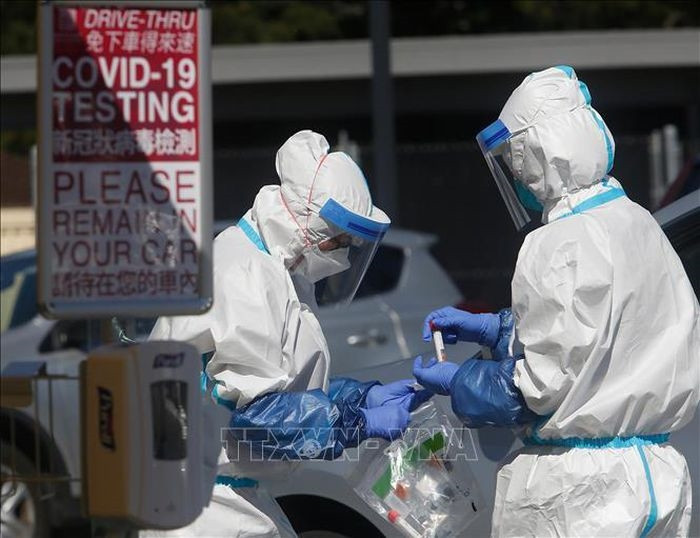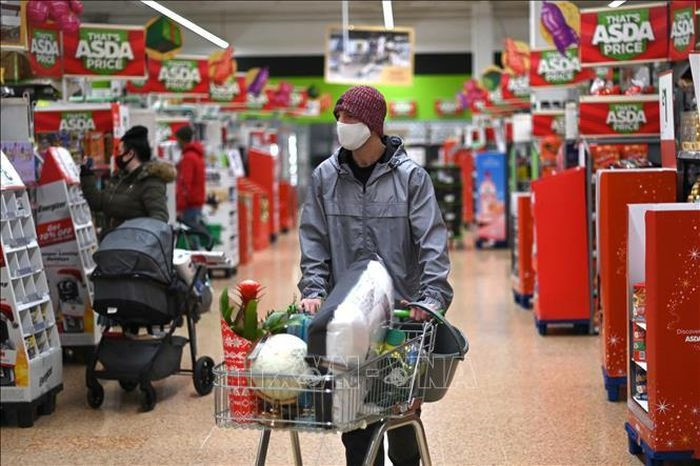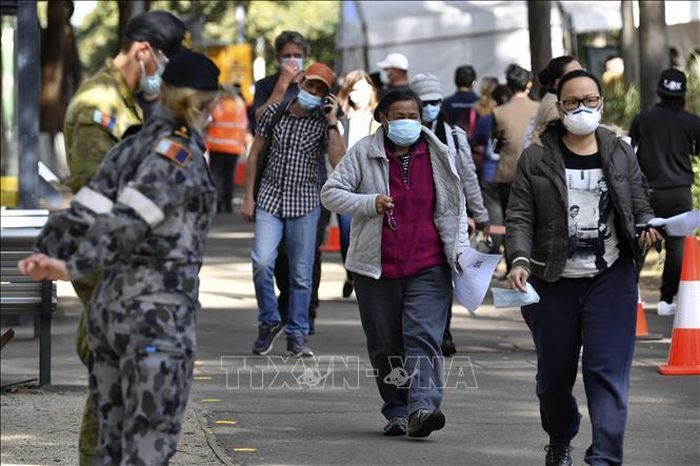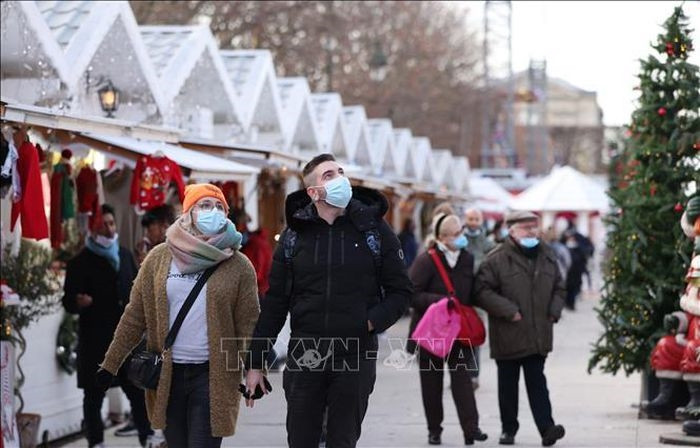Nearly 70 doctors and nurses in the Intensive Care Unit of a Spanish hospital have tested positive for the SARS-CoV-2 virus after attending a Christmas party.

Medical staff prepare COVID-19 testing equipment at a parking lot in Daly City, California (US). Photo: The Chronicle/TTXVN
More than 100 people at the party were also at high risk of contracting the disease. This incident once again shows that vigilance against the spread of SARS-CoV-2 virus during the Christmas and New Year season is never an old lesson.
With less than 2 weeks to go until Christmas, the number of new cases in the world in the past 7 days has tended to increase again, nearly 4,233,000 cases. Omicron is "covering" more and more on the world map with 60 countries and territories reporting cases of this variant.
According to the Director of the US Centers for Disease Control and Prevention (CDC) Rochelle Walensky, it is estimated that in the past 7 days, the US recorded about 118,000 cases/day, an increase of 16% compared to last week and an increase of 23% compared to Thanksgiving.
The average number of deaths in the US is 1,100 cases/day, up about 28% compared to the previous 7 days. The number of people requiring hospitalization also reached 7,441 people/day, up about 16%. The Omicron variant has "taken root" in 25/50 US states while the Delta variant still accounts for 99% of new cases in this country.
Experts say that although 60% of Americans have been fully vaccinated and 15% have received a booster shot, the increasing number of cases and deaths shows that in addition to vaccination, it is extremely important to follow disease prevention measures to avoid the risk of the pandemic getting worse as Christmas and New Year approaches.
With infection and hospitalization rates up 43% and 29% respectively since the Thanksgiving holiday, New York State has just issued a regulation requiring the wearing of masks in all public places in enclosed spaces across the state, from December 13 to January 15, 2022. Individuals or organizations that violate the regulations will be fined $1,000 per case.
According to Dr. Mary Bassett, New York State Health Officer, community spread of the disease requires a community-scale solution, vaccination and mask wearing are necessary to reduce the spread of the disease.

People shop at a supermarket in London, UK. Photo: AFP/TTXVN
The UK recorded a "sad record" as the number of new daily cases rose to its highest level since early January 2021 with 58,969 cases on December 10. Health officials warned that the UK is facing a worrying situation as the fast-spreading Omicron variant causes the number of infections to double every 2-3 days. An estimated 30% of new cases in London are due to the Omicron variant.
If the current trend continues, Omicron is likely to become the dominant variant in the UK, with more than 1 million cases by the end of the month. British epidemiologist John Edmunds has even warned that the number of Omicron cases in the country could exceed 60,000 cases per day in the two weeks before Christmas.
Prime Minister Boris Johnson's government has launched a "Plan B" for England to contain the spread of the Omicron variant, requiring people to work from home, wear masks in public and use vaccination certificates. Meanwhile, people in Scotland have also been advised to limit Christmas parties.
According to the explanation of British Health Secretary Sajid Javid, the imposition of these new restrictions is a long-term calculation, helping to avoid the risk of having to tighten control during the New Year, while also extending the time for people to have time to get a booster shot of the vaccine, thereby protecting the community from the risk of more severe illness in the case of the Omicron variant that can be partially resistant to the vaccine.
Several countries have also enacted stricter anti-epidemic regulations. France, which is experiencing its fifth wave of the pandemic, has issued a series of regulations that will take effect for four weeks from December 10, including closing nightclubs, wearing masks and showing vaccination cards in enclosed public places.
According to the French Public Health Agency, the incidence rate in this country is currently 448 cases per 100,000 people and this number is likely to increase further when the Omicron variant has appeared.
Meanwhile, Germany passed a new law requiring doctors, nurses and staff working in hospitals, clinics and nursing homes to have proof of vaccination or have had the disease within the past six months. The new law also allows 16 German states to close bars and restaurants and ban large events and large gatherings due to high infection rates.
Norway, Sweden, Poland and Ireland have also been quick to impose restrictions.

People wear masks to prevent COVID-19 in Sydney, Australia on August 18. Photo: AFP/TTXVN
Australia - which began reopening its borders a month ago after more than a year of border controls - has suspended plans to allow migrants and international students to enter for two weeks over Omicron concerns.
Japan has closed its borders to most non-citizens, including international students, business people and people visiting family.
The Philippines has temporarily suspended plans to allow fully vaccinated international visitors to enter the country.
South Korea, which has recorded more than 7,000 new COVID-19 cases per day, has also reimposed restrictions and introduced a "vaccine card" to limit all gatherings and encourage people to get vaccinated from December 6 to January 2, 2022.
It is clear that whether the Delta variant is dominant or Omicron is likely to become the dominant variant in the coming time, countries around the world have "absorbed" the lessons of the epidemic after each large gathering during Christmas, New Year or festivals.
The unprecedented outbreak in many states in the US, including New York and California, after Thanksgiving and Christmas last year, when millions of people ignored expert advice and still traveled or gathered, or the second wave of the epidemic caused by the Delta variant in late April after a series of festivals that caused India to continuously witness a sharp increase in the number of cases and deaths... are typical examples. Therefore, raising epidemic prevention vigilance before Christmas and New Year is something that countries need to focus on.

People wear masks to prevent COVID-19 while visiting a Christmas market in Paris, France on December 9. Photo: THX/TTXVN
In addition to basic epidemic prevention measures, vaccination and expanding the vaccination target are also taken into account. In the past week, Singapore, Australia, Indonesia... have expanded the vaccination target to children aged 5-11. Along with that, countries are also promoting booster shots as many studies show that the "immune shield" created by vaccines will decrease after 6 months of completing vaccination.
In Vietnam, Ho Chi Minh City has started giving booster shots to people since December 10, mainly to frontline workers such as police, volunteers, militia and the elderly.
According to Mr. Stephen Hahn, former commissioner of the US Food and Drug Administration (FDA), the mutation and increased likelihood of the SARS-CoV-2 virus variants appearing will require booster shots to be administered annually, similar to seasonal flu vaccination.
The emergence of the Omicron variant at the end of the year, just before Christmas, seems to be a reminder of the complexity and unpredictability of the pandemic. The lesson of tightening epidemic prevention measures and raising awareness is once again reminded so that everyone can have a safe Christmas.
According to VNA